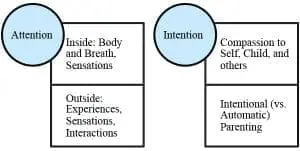Be More “Present” in Your Parenting

Be More “Present” in Your Parenting
Do you ever feel like you are not fully present for your child? Your mind is somewhere else…perhaps making a grocery list or replaying a recent interaction? Are there times when you react to your child and later realize that it had little to do with their behavior?
Maybe you were a bit snappy because of a conflict you had hours ago with a coworker. We all have times when we find ourselves distracted by our thoughts or overreacting to situations, especially with those we love.
The parent-child relationship is a beautiful, intimate experience. Parenting a child with a disability means that there are extra things to consider. A child with a disability may have needs that require special attention and challenging behavior as a result of communication breakdowns or other difficulties. Children with disabilities may require additional therapies and supports – creating higher demands and a very busy schedule. Labels such as ASD or ADHD can shape the way we think and feel about our children and…ourselves. For example, difficult situations may trigger a chain of negative thoughts such as: “It’s because of his autism,” “He’ll never be able to take care of himself,” or “I’m never going to have time for me again.”

As stressors accumulate, and thoughts like these come up, we may experience unpleasant feelings such as guilt or sadness. Along with these thoughts and feelings, we experience physiological changes such as muscle tightness, increased heart rate, and irregular breathing. Often, even without our noticing, we find ourselves in a constant state of hyper-vigilance and tension.
What if we could retrain ourselves to be in the moment, de-stress and respond to our children in positive, productive ways?

Researchers, such as Jon Kabat-Zinn and Susan Bogels, have begun to apply mindfulness to parentchild relationships. Mindful parenting can be defined as intentionally bringing a nonjudgmental moment-tomoment awareness to the parent-child relationship. Mindful parenting has been found to be associated with decreased parent stress as well as less challenging behavior in children.
Related: Why is Mindfulness a Superpower
How Mindful Parenting Works
Mindful parenting allows us to improve our ability to attend, or notice, what is happening both inside of us and around us. This means that we can slow down and be more aware and present when interacting with our children. By listening with our full attention during parent-child interactions we are able to be more emotionally aware.
Mindful parenting also allows us to focus on our intentions, or what is important to our family. Through compassion for our children (and ourselves), we can overcome patterns of automatic parenting, where we might find ourselves going through the motions or overreacting. We can replace these patterns with experiences and actions we really value. Mindful parenting strategies may be used to improve our attention, and therefore presence in circumstances with our children, as well as increase our intention to align our actions with our family values.

Mindful Parenting strategies
We can use mindfulness practices in quiet meditation to rejuvenate ourselves after the children go to school or to bed. In this case, we will want to find a comfortable position, such as sitting or lying down, in a place we will not be interrupted. We begin by taking deep breaths and focusing our attention on the breath. As sensations, thoughts, and emotions show up, we gently and firmly guide the attention back to the breath. We can become more aware by noticing and labeling these sensations, thoughts, and emotions. For example, if we hear the dishwasher change cycles, we can label that “sound.” This sound might trigger a thought (e.g., “I need to unload the dishwasher”). When thoughts appear, label them “thought” or “thinking.” We will experience emotions, too like happiness…..worry….sadness. Labeling these will allow us to be more aware of our emotions.

We can also use mindful parenting strategies in the moment, during routines in which we want to be particularly engaged or tend to have higher levels of stress (e.g., meals, transitions, baths, community outings). For example, sometimes when we are interacting with our children, our mind begins to wander. Or, one thought leads to another…maybe even a negative thought pattern or unpleasant feeling. In these moments, it can also be useful to practice noticing and labeling. This practice can put some space between our thoughts/emotions and this moment. It might allow us to be more present with our children and even notice something really wonderful in them. Taking the time to be engaged with our full attention can ensure that we don’t miss out on valuable opportunities to be responsive. This will also help us be more aware of “teachable moments” during family routines or community activities and be more conscious of our parenting.

Regardless of if we are meditating by ourselves or using a strategy with our child, it is helpful to plan ahead, using the practices when they are most helpful. Here are some examples of strategies that can help increase our attention and intention.
Attention – strengthening Moment-to-Moment Awareness
1. Deep Breathing – Take a few full, slow breaths. Allow your abdomen to expand as you inhale, and contract as you release your breath. Notice the sensations as air enters and exits your body.
2. Scanning Body – Become aware of physical sensations, such as tingling and tension in different parts of your body. Place all of your attention on one body part, such as the forehead and notice any sensations, or lack of sensations. Then, shift your attention to another part of body part such as one arm, the other arm, then the chest, stomach, and down each leg, noticing what comes up along the way.
3. Being Present – Focus your attention on sensory experiences such as sounds, smells, and tastes and to your child’s verbal and nonverbal cues. Take the time to pay attention to their facial expressions and body language during a family routine.
Intention – Overcoming Obstacles and embracing Values.
1. Reminding Yourself – Set up reminders of your parenting intention. One way is to link your intention with a reminder on your phone. You might even choose a pleasant sound such as a bell or chime. Take 1-2 seconds to pause and think of your intention.
2. Cultivating Kindness – Focus your attention on a loved one and repeat a phase such as: “May you be open; May you be understanding; May you be happy” a few times. Next, shift your attention to yourself, then a neutral person, then to a person who triggers irritation, repeating the phrase each time. Expand your attention to all of the people around you, and finally to everyone.
3. Creating space – Pause and take a few deep breaths during a challenging parent-child interaction. This involves activating a gentle and compassionate inner voice and telling yourself to breathe, so you can “re-ground” and possibly slow down your heart rate.
The strategies listed here are just a few examples of ways to increase attention and intention in parenting. Mindful parenting involves actively applying a nonjudgmental and present moment-to-moment awareness to the parent-child relationship. As with most things, it is best achieved with ongoing practice.![]()
Related: 11 Reasons Why You Should Try Mindfulness Meditation and How to Do It!

Meme Hieneman, has a Ph.D. in Special Education and is nationally certified as a behavior analyst. She has published a variety of articles, chapters, and books including “Parenting with Positive Behavior Support: A Practical Guide to Resolving Your Child’s Difficult Behavior.” In her professional career, Meme has worked with children with severe behavior problems for more than 20 years.
You May Also Like
- Why Me? Why My Child? Wisdom Found in the “Hero’s Journey”
- 11 Reasons Why You Should Try Mindfulness Meditation and How to Do It!
- Your Aura and Its Connection to Alternative Medicine
- New Year’s Guide to a Powerful & Harmonious You
- How to Protect Your Mental Health During Coronavirus
- Staying Calm While in the Chaos of the Storm
- What Is Emotional Intelligence and Why Is It so Important?
- Tech for Developing Mental Strength for Life’s UPS and Downs
- The Science of Happiness
- Journal Writing Can Help You to Reconnect with Yourself
- Art Therapy: How It Works, the Benefits, How to Start
- Where’s the RESPITE?
- My Relaxing Escape
- Anxiety in Children and Adolescents
- 5 Steps to Help Your Child Manage Emotions
- Mental Health Is Not Something to Take for Granted: How to Manage Depression and Stress During the Holidays
This post originally appeared on our November/December 2016 Magazine


